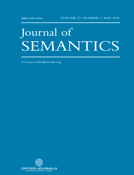-
Views
-
Cite
Cite
Andrea Bonomi, Truth and Reference in Context, Journal of Semantics, Volume 23, Issue 2, May 2006, Pages 107–134, https://doi.org/10.1093/jos/ffh034
Close - Share Icon Share
Abstract
In communicative exchanges one of the most familiar phenomena is accommodation, which enables the addressee to incorporate a missing piece of information into her own view of the common ground. A less familiar, but equally important, phenomenon is what I call discommodation, whose main feature consists in the fact that the missing piece of information, although essential to the comprehension of the utterance, cannot be shared by the addressee because it sounds problematic or even false to her. In such cases it is possible to open a ‘presuppositional slot’ to take into account the assumptions that serve to select the reference of the noun phrase, but that are not incorporated into the revised context. One of the main purposes of the paper is to propose a definition of truth (with respect to a presuppositional apparatus) that does not ignore the role of discommodation when different views of the common ground are involved.1



